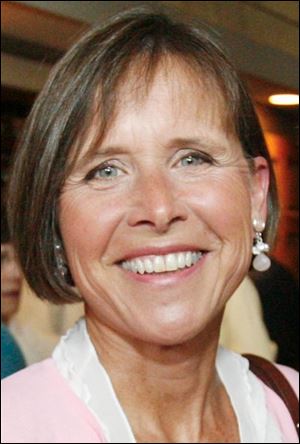
Fatal diagnoses in the unborn bring new needs
10/26/2007
Folk-Axe
Medical advances that allow doctors to diagnose more fatal conditions in unborn babies have led to a new need: helping grief-stricken families cope.
Toledo Hospital and Toledo Children's Hospital are trying to assist through what they are calling perinatal hospice.
Parents fear they are going to be abandoned because their babies have been diagnosed with fatal conditions and are not expected to live long, if at all.
And they wonder whether they will have live newborns and, if so, whether they will be suffering, said Kim Folk-Axe, newborn intensive care unit social worker for Toledo Children's Hospital.
The nascent hospice program will help address those and other issues, she said.
"Every parent hopes their [child's] diagnosis is wrong and they're going to have the miracle baby - and sometimes they do," Ms. Folk-Axe said.
Perinatal hospice programs are becoming more common nationwide, in part, because technology is allowing doctors to diagnose fatal conditions during pregnancies, said Amy Kuebelbeck, a freelance writer in Minnesota who has a Web site, perinatalhospice.org, that tracks the trend.
"This is a new phenomenon - this is a new need," she said.
There were no perinatal hospice programs nationwide 10 years ago, but now there are more than 50, said Ms. Kuebelbeck, who wrote a memoir about continuing a pregnancy with a terminal diagnosis.
Her son, Gabriel, was diagnosed prenatally with a congenital heart defect and died shortly after his full-term birth in 1999.
Ms. Kuebelbeck is to speak at Toledo
Hospital on Jan. 16 to doctors, pastors, parish nurses, parents, and others about perinatal hospices.
The hospice program provides comfort, pain management, and other palliative care, and it is part of the bereavement services Toledo Hospital has offered parents for 30 years, said Liz Jackowski, clinical director of obstetrics.
Parents can deliver their babies at their community hospitals even if they seek hospice support from Toledo Hospital, Ms. Folk-Axe said.
"They need to be with family and friends and the [doctors] who delivered their other babies," she said.
After a fatal diagnosis is determined, a care plan is developed with parents, Ms. Jackowski said.
They make plans, for example, for spending time with their babies after delivery as well as their eventual burials, she said.
Parents also discuss topics such as how much pain medication to use during birth so mothers remember more time with their newborns, planning a contingency nursery in case their children live for a while, and preparing their other children, Ms. Folk-Axe said.
"We bring a lot of things to the surface," Ms. Jackowski said. "We let them call the shots. This is their plan."
Contact Julie M. McKinnon at: jmckinnon@theblade.com or 419-724-6087.